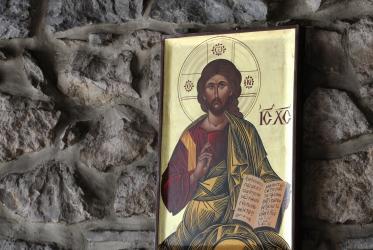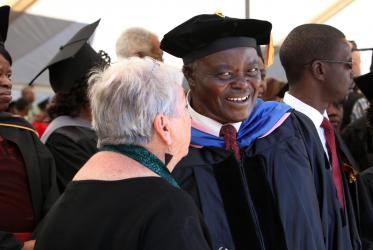(as adopted by the Harare Assembly, December 1998)
The text below reports the official adoption and launching of the Special Commission, through the recommendations of the Policy Reference Committee I. It sets out the understanding of the Special Commission's mandate, scope, and tentative timeline, and specifies the governing bodies through which it would operate.
V. Relationships with the Orthodox churches
In the period following the Canberra assembly it has become clear that the relations of the Orthodox churches with the Council have reached a critical stage. Indeed, two Eastern Orthodox churches have withdrawn from membership in the WCC: the Church of Georgia in 1997 and the Church of Bulgaria in 1998. In their reports to the assembly both the moderator and the general secretary gave thoughtful and careful attention to an assessment of the reasons which have brought the fellowship of the WCC to this critical situation.
At a meeting in Thessaloniki in May 1998, the Eastern Orthodox churches gave their initial evaluation of the current situation and proposed that a commission be created with the WCC to discuss "the acceptable forms of Orthodox participation in the ecumenical movement and the radical restructuring of the WCC". Also in May 1998, at an Orthodox pre-assembly meeting in Damascus, the Oriental Orthodox and Eastern Orthodox church representatives together evaluated the ecumenical situation in which the Orthodox find themselves. They saw "the need for change which would enable a more effective presence and witness, together with a more constructive and engaged participation of the Orthodox".
The WCC's executive committee has given careful attention to the relationships of the Orthodox churches with the WCC and has affirmed the principles for the creation of a special commission and for the scope of its work (executive committee, Amersfoort, September 1998, doc. no. 7; executive committee, Harare, Zimbabwe, December 1998, docs no. 5 and 5.1).
While it is the Orthodox concern about the nature and quality of the WCC ecumenical fellowship which has brought before the assembly the need for a special commission after Harare, it is clear that other churches and ecclesial families have their own -- and sometimes similar -- concerns which will find expression in the work of the commission. Thus in the commission's work, the WCC fellowship will continue the journey "towards common understanding and vision" and make a contribution to the life and ecumenical vision of all the member churches of the WCC. If the commission's work enables the churches, the families of churches and the World Council of Churches to address constructively the challenge we face, this will constitute a living and practical example of the new ethos we are seeking. The opportunity is offered, therefore, not only to manage the present critical situation, but to make a contribution to the quest for Christian unity -- a quest not just for negotiated structural compromises but for discernment of God's will, God's truth, and God's love.
The eighth assembly approved the creation of the special commission on Orthodox participation in the WCC, with half of its members to be determined by the Orthodox churches and half by the executive committee of the WCC after consultation with other member churches.
Further, the eighth assembly:
- requested that the special commission study and analyze the whole spectrum of issues related to Orthodox participation in the WCC, recognizing that many of these concerns are of importance to other member churches as well;
- asked that the special commission make proposals concerning the necessary changes in structure, style and ethos of the Council;
- suggested that such proposals will be brought before the central committee for consideration and decision, while necessary constitutional changes will be presented to the next WCC assembly;
- proposed that the full scope of the commission's work be projected for a period of at least three years.

